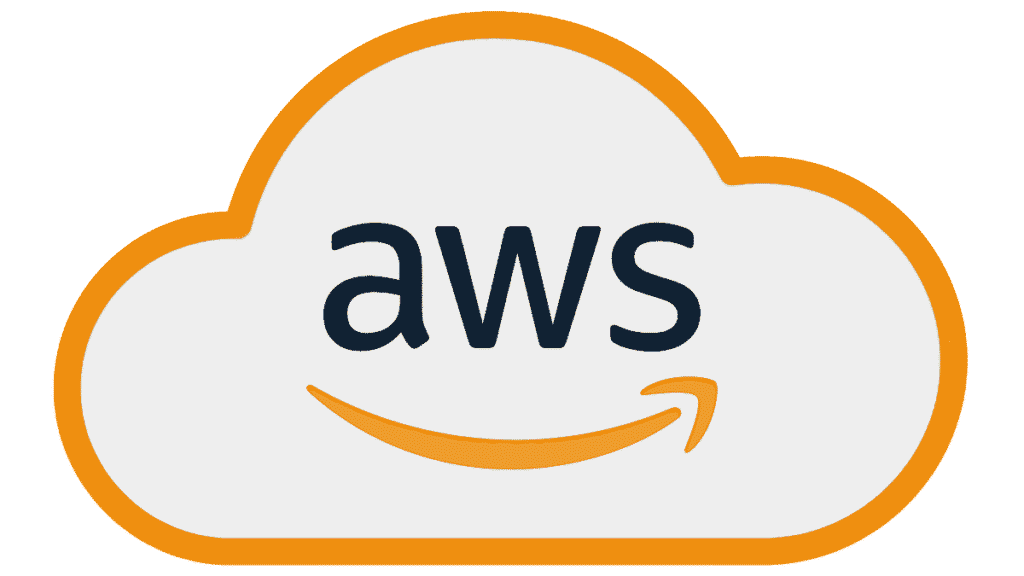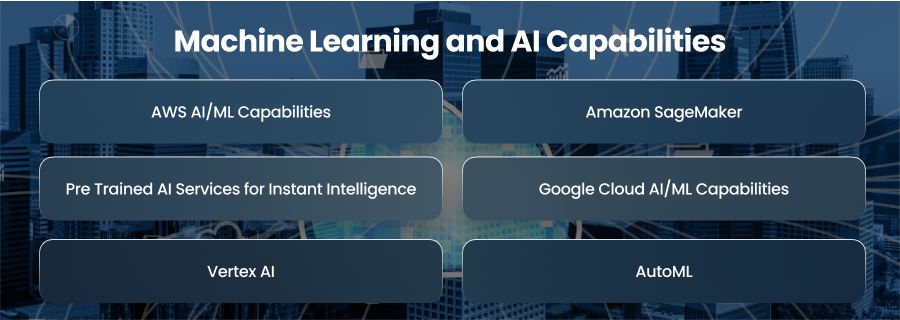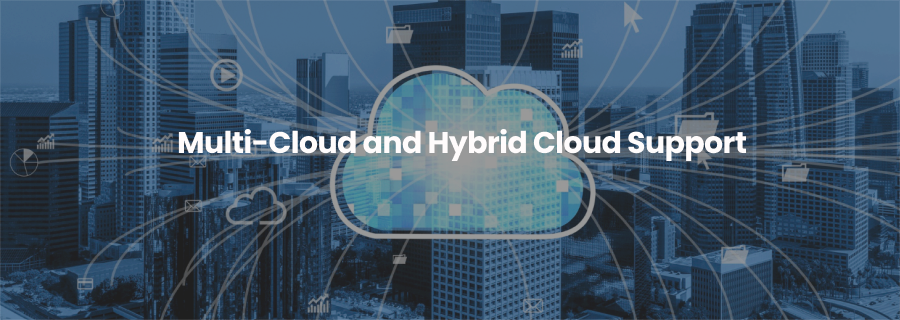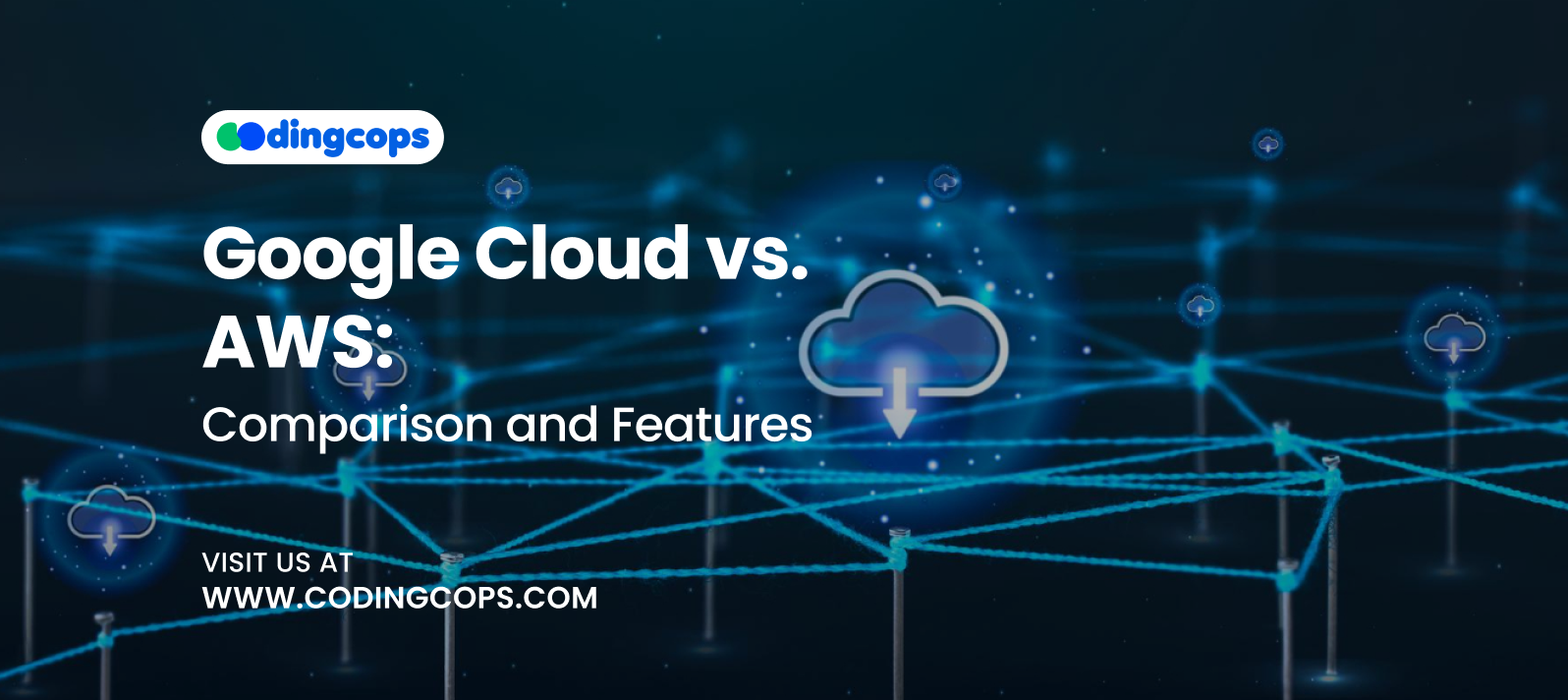According to CloudZero, the market for cloud computing is expected to grow to $1 trillion over the next three years. Cloud computing is becoming the foundation of modern IT infrastructure as a result. From startups to multinational corporations, businesses are increasingly shifting their operations to the cloud.
AWS and Google Cloud are the leading providers of cloud computing and infrastructure. These are two powerhouses that offer reliable services to meet virtually every digital need.
So, in this guide, we will compare both of these cloud providers to help you determine the best fit for your business.
Google Cloud

The whole range of cloud computing services offered by Google Cloud Platform enables companies to create and implement apps on top of Google’s incredibly dependable and scalable infrastructure. Furthermore, Google Cloud Platform is quickly becoming a formidable competitor in the cloud market, particularly in fields like big data.
Furthermore, what makes Google Cloud distinct is its strong connection with Google’s technology. Hence, this gives Google Cloud an inherent advantage in scalability and performance.
AWS

Amazon Web Services is the cloud computing juggernaut that changed the industry. As the first major cloud provider, AWS has the most mature and comprehensive ecosystem. Moreover, AWS has over 200 fully featured services spanning computing and databases.
Also, what sets AWS apart is its global infrastructure and proven enterprise grade reliability. So, whether you are running a basic web app or a global machine learning pipeline, AWS can handle it.
Service Comparison of Both Google Cloud and AWS
The range and complexity of services provided should be considered when contrasting AWS vs Google Cloud. Additionally, both platforms offer comprehensive cloud solutions that encompass everything from machine learning to computation.
| Category | AWS | Google Cloud |
| Compute | EC2, Lambda, Elastic Beanstalk | Compute Engine, Cloud Functions, Cloud Run |
| Storage | S3, EBS, and Storage Gateway | Cloud Storage, Persistent Disk |
| Networking | VPC, CloudFront, Route 53 | VPC, Cloud CDN, Cloud Interconnect |
| Databases | RDS, Aurora, DynamoDB | Cloud SQL, Firestore, BigQuery |
| Machine Learning | SageMaker, Forecast, Rekognition | Vertex AI, AutoML, TensorFlow |
| DevOps | CodePipeline, CodeDeploy, CloudFormation | Cloud Build, Cloud Deploy, Deployment Manager |
| Containerization | ECS, EKS, Fargate | Google Kubernetes Engine |
| Analytics | Athena, Redshift, QuickSight | BigQuery, Dataflow, Looker Studio |
1. Machine Learning and AI Capabilities

AWS AI/ML Capabilities
Within the cloud ecosystem, AWS offers one of the most comprehensive and sophisticated sets of AI and machine learning capabilities. AWS offers the infrastructure and resources you need to put smart ideas into practice, regardless of your degree of experience as a data scientist or machine learning engineer. Furthermore, a broad variety of use cases is supported by its products.
Amazon SageMaker
Amazon SageMaker, a fully managed platform that enables customers to design and apply machine learning models fast, is the cornerstone of AWS’s machine learning infrastructure. Additionally, SageMaker streamlines the whole machine learning workflow by controlling procedures like data labeling. TensorFlow is among the many wel known open source frameworks that it supports. It is also tightly integrated with other AWS services, like Amazon S3.
Additionally, it has advanced features like SageMaker Autopilot, which speeds up development while maintaining control by automatically creating machine learning models.
Pre Trained AI Services for Instant Intelligence
Additionally, AWS offers a number of pre trained AI services that let programmers incorporate intelligence into their apps without having to create or manage their own models. These include Amazon Comprehend for natural language processing tasks like entity recognition and sentiment analysis, and Amazon Rekognition for picture and video analysis.
Google Cloud AI/ML Capabilities
Google Cloud Platform stands out as a leader in artificial intelligence and machine learning due to its deep integration with Google’s own AI research and its long standing commitment to open source frameworks.
Vertex AI
Vertex AI is a fully managed end to end ML platform that brings together Google’s powerful AI tools into a single workflow. Vertex AI enables users to build and train models with significantly less code. Furthermore, it supports custom model training using popular frameworks like scikit-learn. Moreover, it offers built in tools for AutoML, which allows users to automatically generate high quality models with minimal machine learning expertise.
AutoML
By allowing users with little to no machine learning experience to train models on their datasets, Google Cloud’s AutoML suite aims to democratize machine learning. Additionally, without a lot of technical know-how, applications like AutoML Vision and AutoML Tables enable the quick development of unique ML models. Hyperparameter tweaking is one of the many intricate procedures that autoML automates.
2. Developer and DevOps Tools
Google Cloud
Google Cloud provides a modern and integration with open source technologies. It offers Cloud Build, a fully managed development platform that supports multi language builds and secure deployments to Cloud Run. Moreover, it allows developers to build and deploy directly from GitHub or Cloud Source Repositories.
Furthermore, for progressive delivery and Kubernetes native deployments, Cloud Deploy provides approval based release pipelines. Additionally, it collaborates with Artifact Registry, which organizes and protects container images and build artifacts.
Additionally, GCP enables declarative resource management for developers by supporting infrastructure as code with tools like Deployment Manager. Additionally, using the editor to create and launch Kubernetes apps is made simple using Cloud Code.
AWS Developer
AWS offers a mature and enterprise grade DevOps toolkit that is deeply integrated across its massive ecosystem. AWS CodePipeline serves as the centerpiece of its development services, orchestrating workflows between tools like CodeCommit and CodeDeploy.
For artifact management, AWS provides CodeArtifect, a managed repository for Maven and other build artifacts. For more versatility, it connects with programs like GitHub Actions and Jenkins.
AWSCloudFormation, a sophisticated Infrastructure as Code platform with JSON templates for resource management, is supported by AWS.
AWS excels in observability through Amazon CloudWatch, offering metric logs and custom alerting. Hence, developers can now monitor real time application performance and set automated remediation actions.
3. Security and Compliance
Google Cloud
GCP has built its security infrastructure based on the same technology stack that powers Google Search and defence-in-depth architecture. At the core is Google Cloud’s global infrastructure, which benefits from custom hardware and end to end encryption by default.
Moreover, Identity and Access Management in GCP offers access control and support for resource level permissions. On the data protection front, Google Cloud offers Cloud Key Management Service and External Key Manager. This gives users complete control over encryption keys and access policies, even integrating with on premise or third party key providers.
AWS
AWS has long been considered a leader in cloud security, offering one of the most extensive security toolsets in the industry. Moreover, it’s shared responsibility model clearly defines what AWS secures and what the customer secures.
Additionally, federated identity and roles are used by AWS Identity and Access Management to provide dependable access control. Additionally, services like Service Control Policies and AWS Organizations aid in the large scale management of permissions across numerous accounts.
Data encryption is baked into AWS from the ground up with AWS Key Management Service and AWS Encryption SDK. Users can manage keys or bring their own using Bring Your Own Key and External Key Store integrations.
4. Multi-Cloud and Hybrid Cloud Support

Google Cloud
Google Cloud has made multi cloud support a central strategy, acknowledging early that enterprises will not operate in isolated cloud silos. Moreover, its flagship multi cloud product, Google Cloud Anthos, is a powerful platform for managing applications across GCP and third party clouds like AWS and Azure using Kubernetes.
Anthos provides consistent policy management and securtiy controls across environments. Furthermore, it abstracts the underlying infrastructure, letting teams focus on managing microservices with Istio service mesh and Config Management for identity based routing and traffic control.
AWS
While AWS has historically focused on being one stop cloud shop, it has recognized the rising demand for hybrid cloud capabilities and is adapting to multi cloud realities. AW’s hybrid strategy is centered on AWS Outposts and AWS Wavelength.
AWS Outposts brings native AWS services, and operating models to on premises environments. Organizations can run compute and analytics workloads locally with low latency, while seamlessly integrating with cloud based services.
Amazon EKS Anywhere allows customers to run Kubernetes clusters on premise with full AWS support, giving development teams a consistent container orchestration experience whether on AWS or on local infrastructure. Moreover, AWS’s Storage Gateway and Direct Connect help bridge on premise and cloud environments with secure and high speed connections.
5. Support and Documentation
Google Cloud
GCP has made significant stride in improving its customer support ecosystem. Furthermore, it offer multiple support tiers catering to startups and enterprise clients.
Moreover, Google integrates AI and machine learning into its support model through tools like Cloud Support API and Recommender, which proactively offer optimization suggestions and flag potential misconfigurations. Additionally, its Active Assist suite uses predictive analytics to suggest cost saving opportunities and performance enhancements.
On the documentation side, Google Cloud provides clear and visually structured documentation. Furthermore, tutorials and reference architectures are available for most services. Also, its developer hub, Google Cloud Skills Boost, offers free and paid courses, and certifications that range from beginner to advanced levels.
AWS
AWS offers a highly mature and widely respected support infrastructure. It provides serveral support plans with tailored SLAs and proactive service monitoring. It’s Enterprise plan includes 24/7 access to Cloud Support Engineers and AWS Trusted Advisor. Moreover, the AWS Support Concierge further enhances the customer experience for billing and account management.
AWS also maintains a massive learning ecosystem, including AWS Training and Certification. Moreover, the AWS Partner Network and its reliable developer forums further provide technical guidance and community driven knowledge sharing.
6. Computation
Google Cloud
Google Cloud’s computation services are built on the same infrastructure that powers Youtube and Gmail. The central component is Google Compute Engine, which offers cost-effective virtual machines that may be customized and enable both preemptible instances. Compute Engine is also well known for its quick startup times and live migration capabilities, which minimize downtime when doing host maintenance.
AWS
With Amazon EC2 as its foundation, AWS provides the most extensive and developed computing ecosystem in the cloud sector. A wide variety of instance types that are tailored for general-purpose and computationally demanding workloads are offered by EC2. Additionally, EC2 is very flexible for businesses thanks to features like Elastic Load Balancing and Spot Instances for cost savings.
7. Storage
Google Cloud
GCP offers a modern and intelligent storage architecture that excels in simplicity and built in intelligence. Moreover, its flagship service, Google Cloud Storage, provides a unified object storage platform with multiple storage classes.
Furthermore, Google Cloud Storage is optimized for analytcis and machine learning workloads, with native integration into BigQuery, making it an ideal choice for organizations utilizing cloud based data processing.
AWS
AWS sets the benchmark in cloud storage, offering the the most diverse and granular portfolio. With storage classes including S3 Standard and S3 Glacier Deep Archive, which are designed for different use patterns and cost optimization, Amazon S3 is their flagship object storage service.
With sophisticated features like S3 Replication and S3 Lifecycle Policies for automated transitions and deletions, S3 stands out for its fine grained access control. Services like Athena and EMR have close integrations with S3.
8. Database Services
Google Cloud
Under its Cloud Databases portfolio, GCP provides a range of database services that are tailored to meet particular workloads and performance requirements. CloudSQL offers fully managed relational database services, including automatic backups and maintenance, for MySQL and SQL Server. Cloud Spanner is one of Google’s standout products, a globally distributed and horizontally scalable database that combines the advantages of conventional relational databases combined with NoSQL’s scalability.
AWS
One of the widest ranges of cloud database services is provided by AWS. Furthermore, Amazon RDS is at the forefront and supports six popular database engines, including MySQL and PostgreSQL. RDS also handles common tasks like patching and scalability, allowing developers to focus more on the logic of the applications.
Final Words
Strong and secure cloud solutions that are suited to a range of corporate requirements are provided by Google Cloud and AWS. Google Cloud is superior in analytics and artificial intelligence, while AWS is superior in scope and customization. Therefore, the specific project goals and the planned integration with other services and tools will determine which option is best.




